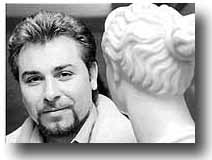2
Roberto Alagna... Quote. Unquote.

Fiona Maddocks of the Evening Standard on Alagna's performance in La
Rondine, Royal Opera House, May 2002...
"Alagna as the lovesick innocent, Ruggero, sang with that unguarded
passion that makes his performances so touching and vulnerable. He
tackled his high notes with the ardour of a boy tossing a ball ever
higher in the air. On the rare occasions he missed, you knew he had
given his all."
_______________________
Roberto Alagna in The Telegraph (7 May 2002) on the epithets he and
Angela Gheorghiu receive in the press...
"I was very proud to be called Bonnie and Clyde. In fact, I had the idea
to do a cover for a CD of movie music dressed like Bonnie and Clyde. Is
the same for everybody. If you have some success, it's the price you pay
that people say bad things about you."
_______________________
Roberto Alagna and Angela Gheorghiu in the same interview on the first
time they met - during the rehearsals for la Boheme at the Royal Opera
House...
"I was little bit late at the rehearsal and I heard Angela's voice
behind the door. I thought, 'My God, it's beautiful but I'm sure the
soprano will be awful.' Then I open the door and I have a very good
surprise."
"First of all I just see his eyes. Then he open his mouth and -
oh, la, la!"
_______________________
Stephen Hastings in Opera News June 2002 on Alagna's performance in I
Pagliacci in Verona...
"Roberto Alagna portrayed a youthful, athletic Canio, alternating boyish
enthusiasm with sudden bursts of terrifying violence. He emphasized the
darker hues in his voice, but without forcing its natural volume. High
notes were secure and fully exploited for theatrical effect but kept
within a tensely drawn legato line, with words projecting vividly.
Rather than make us observe from a distance a defeated, self-pitying
figure who turns to violence, Alagna forces us to share Canio's sense of
betrayal and overwhelming desire for vendetta. This was a great
performance, which deservedly won him enthusiastic ovations."
_______________________
Eric Dahan in Libération (7 June 2002) on Alagna's CD Bel Canto...
"On décellophane le nouvel Alagna vibrant du souvenir de son Rodolfo
affolant de générosité. Dès l'air du Poliuto de Donizzetti, on retrouve
les qualités solaires du «quatrième ténor», la diction et la façon
impériale de timbrer, la noblesse du chant dont le médium s'est encore
élargi et enrichi de couleurs chaudes, et dont l'aigu flirte désormais
avec l'héroïsme le plus éclatant. Les notes en registre mixte de l'air
de la Sonnanbula de Bellini en duo avec son épouse Angela Gheorgiu,
comme celles, dans un français à mourir d'élégance, de la Favorite,
semblent tissées dans la matière des songes... Le style est aussi mixte,
et l'on imagine les puristes du bel canto, irrités par cette façon
juvénile de risquer attaques et couleurs franches, dans des registres
aussi délicats. Mais c'est justement cette jeunesse qu'on adore, car son
sourire témoigne de la passion la plus vraie."
_______________________
Alagna at the cast party following 'A Concert of Passion and Poerty' from 'A quite posh afterlife' by Ann Conway, Los Angeles Times (January 19, 2003)...
"I hope I've finished dying today -- two times is enough!" tenor Roberto
Alagna joked as he joined board members of Los Angeles Opera for a reception
and dinner at the Regency Club following his debut at Dorothy Chandler
Pavilion. At Placido Domingo's behest, the opera star came from Paris at the
last minute to perform in "A Concert of Passion & Poetry," a heavy-hearted
pastiche that included Acts 3 and 4 of Massenet's "Werther" and Act 4 of
Verdi's "Otello." "He not only died twice, he had to sing at the same
time -- and once on his side," quipped board President Frank Baxter.
But after all the operatic mayhem, Alagna, frequently referred to as "the
Fourth Tenor," emerged from his performance feeling exhilaratingly alive.
"For me, it was fantastic, a miracle, because it was a real adventure to
come here and learn the repertoire at the last moment," he said in a
captivating French accent. "It is a very heavy repertoire, very strange. You
don't sing 'Werther' and 'Otello' on the same night. It was a big pressure
on me -- but at the same time, very exciting."
_______________________
See Also:
This page was last updated on: May 31, 2004